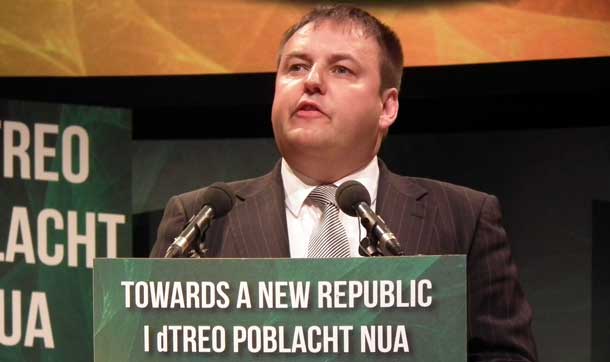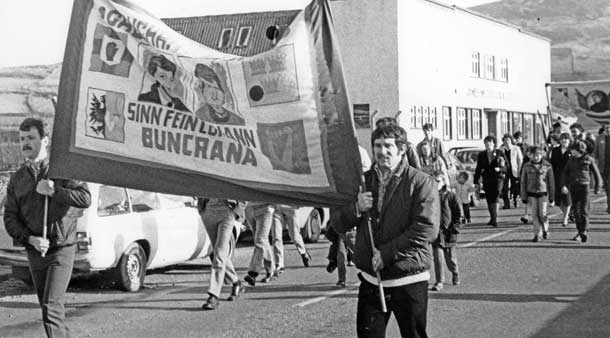25 May 2012 Edition
A fighter like his father
INTERVIEW | PÁDRAIG Mac LOCHLAINN, SINN FÉIN TD FOR DONEGAL NORTH-EAST, SPOKESPERSON ON FOREIGN AFFAIRS AND TRADE

• Pádraig Mac Lochlainn speaks at the 2011 Sinn Féin Ard Fheis in Belfast
‘Eddie Fullerton was a major influence on me. He had incredible charisma and a wonderful personality. He had an affinity for young people and he always encouraged us’
LEINSTER HOUSE. As I waited for Pádraig to arrive from the British/Irish Parliamentary Assembly that was taking place in Leinster House, I glanced at the items adorning the walls of his office. On one wall hangs a massive poster declaring “Donegal - Ulster Football Champions 2011”. Behind his desk is a framed, painted handkerchief of a Celtic Cross made by Irish POWs in the 1980s; it is dedicated to his late father, Volunteer Réamonn Mac Lochlainn. On the noticeboard is pinned an An Phoblacht article from February 1984 highlighting the refusal of the then Labour Environment Minister to meet with Buncrana Sinn Féin Councillor Eddie Fulletron. A poster calling for UN recognition of Palestine as a full member state hangs beside the window.
Pádraig arrives from the Assembly meeting. As is often the case, he’s smiling. He starts off by telling me about his childhood. He was born in Leeds, in England, to Irish parents Réamonn and Mary Mac Lochlainn but spent most of his time in Birmingham. When he was only 18 months old, his father, who was part of a highly effective IRA unit, was captured and sentenced to 12 years in prison. Pádraig tells me while he was obviously too young to remember his father’s initial capture, he has memories of travelling across wide expanses of England to visit him.
During that period the practice of ‘ghosting’ (moving prisoners between prisons without notice) was common and Réamonn was frequently moved between Hull, Parkhurst and Albany, all maximum-security prisons. “On occasions myself and my mother would have travelled across England to visit him only to be told he had been moved the night before so that was particularly harsh,” he says. Throughout this tough period he says it was his mother who was the real hero during his father’s imprisonment. “We faced a lot of hostility from English people when they found out he was an IRA man and it was very tough on my mother being apart from my father for so long, but I was sheltered from most of that.” While in prison Réamonn wrote to Pádraig, encouraging him to learn new words from the dictionary or to study the countries of the world on a map so “for me it was exciting, going to visit this great man every month but I was really very sheltered from the impact”.
In anticipation of Réamonn’s release, the family moved to Buncrana, County Donegal, in December 1983 and his father was released shortly afterwards. He says it was difficult adjusting to his new school at first, particularly because as a ten-year-old he had an English accent. “Ironically, the son of an IRA prisoner was nicknamed ‘Paddy Brit’,” he smiles. “I got into a lot of fights over that but I am now no longer known as ‘Paddy Brit’, so the fights must have worked,” he laughs.
Only a few years after being released from prison, Réamonn died in a tragic drowning accident. “I really struggled in the years after he died,” says Pádraig. He says family members and friends helped him to channel his anger in a constructive way. From then on he developed a ferocious interest in Irish history and current affairs along with international topics and read whatever books he could get his hands on. He also became involved with Sinn Féin during this period and got to know Councillor Eddie Fullerton.
“Eddie was a major influence on me,” he says. “He had incredible charisma and a wonderful personality. He had an affinity for young people and he always encouraged us. He was a strong man but very soft-hearted and wonderful to be around.” On 25 May 1991, the republican community of Donegal was left in shock as news broke that Eddie had been shot dead by loyalist gunmen at his home in Buncrana. Only hours before, Pádraig and others had been out on a picket organised by Eddie in opposition to proposals to locate an incinerator nearby.
Pádraig says the news of his murder devastated the entire community: “A family member knocked on my window and told me that Eddie has been assassinated and we were absolutely heartbroken. Just devastated.” The death of such a fine representative also had a massive effect on Sinn Féin in the area: “It took nearly ten years to get things moving again. Eddie had been a one-man powerhouse in terms of work and activism and energised all those around him.”
Pádraig went on to become a spokesperson for the Irish National Organisation for the Unemployed (INOU) and worked closely with them for almost ten years. He says this period taught him a lot and really framed his views on politics.
“The INOU is a great organisation,” he says. “They’re not just about holding up placards, they’re about constructive activism. They developed the back-to-education allowance, the area enterprise allowance. In a lot of ways they’re similar to Sinn Féin today in that we’re not just about protest — we really want to make things better and we work hard at policy and real alternatives.”
In the Dáil, Pádraig has never backed down on issues, particularly ones that affect his native Donegal.
“Partition had a profound impact on Donegal. Our county’s umbilical relationship is with Derry, Tyrone and Fermanagh.We’ve always been neglected and we’ve always had a high unemployment rate which is always running at multiples of the ‘national’ average. The current unemployment rate in the state is 14.5% but I’d say it’s twice that level in Donegal; it’s really horrendous.”
He says making the transition between local council and Leinster House has been tough and he’s had little time to himself, “but the way I look at it is if I think of what my father and his generation went through”, he says, “they were imprisoned and worse, so it’s tough but not nearly as tough as what went before me.”
I ask him about the way Leinster House operates. Other TDs I’ve spoken to have been critical about how archaic the system is. Pádraig agrees but is more optimistic: “Government will always try to have an institution that minimises their accountability,” he says. “Look at Leader’s Questions, rarely will Gerry Adams or Mary Lou McDonald get an actual answer to the questions they’ve asked. The key thing for us is to be smart about our time here. This is a site of struggle so we need to be efficient when we’re here and get out on the ground in our communities when we’re not. This place isn’t the be-all and end-all and I didn’t come here to administer bureaucracy; I’ve come here to represent the people of Donegal North-East. So I’m here to fight for them and the people we in Sinn Féin represent.”
When we move on to discuss his portfolio as Sinn Féin spokesperson on Foreign Affairs and Trade his eyes light up and he really gets into his element. He has fiercely defended the rights of the Palestinian people and put it up to Foreign Affairs Minister and Labour Party leader Eamon Gilmore by calling on him to extend recognition to the Palestinian state.
“It’s heart-breaking what’s taking part in the Occupied Territories,” he says, “particularly the West Bank where the illegal Israeli settlements continue to be built, the ethnic cleansing of Palestinians continues, and every day the Oslo Accords are being undermined.”
He speaks with passion on European and US involvement in the Middle East. “Europe and the US have applied double-standards for so long,” he says. “They challenge Iran on the possibility of it building nuclear weapons while Israel, which is a belligerent within that region, has hundreds of them. How can you try to convince anybody of your good faith when you ignore this and you ignore Israeli ethnic cleansing in the West Bank? You can’t, and you simply cannot be seen as an honest broker.”
Pádraig says he’s “very respectful” of the TDs who carried Sinn Féin through previous years. “Caoimhghín Ó Caoláin, Arthur Morgan, Seán Crowe, Aengus Ó Snodaigh and Martin Ferris all did fantastic work. Aengus would’ve headed up foreign affairs before me and he did tremendous work on the Middle East and was involved with the Gaza aid flotillas, while Bairbre de Brún did great work on the issue of the Basque Country and climate change as an MEP.”
Finishing off the interview, Pádraig says that solidarity between small nations and internationalist thinking is something that must remain at the core of Irish republicanism.
“Our opponents would always try to present Sinn Féin as ‘Little Irelanders’ or as having an inward-looking view. That’s not the case. Republicans have always looked to an internationalist solution. The problems in Ireland cannot be solved without solidarity between people of the Left across Europe. Sinn Féin are very proud to be part of an international movement of resistance, of struggle between peoples across the globe. I’m very proud to stand with those wonderful people who are fighting injustice across the world.”

Volunteer Réamonn Mac Lochlainn (right) carries a banner at an anti-extradition demonstration in Buncrana in 1984




